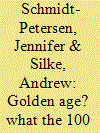| Srl | Item |
| 1 |
ID:
156900


|
|
|
|
|
| Summary/Abstract |
In a context where widespread failings in the nature of terrorism research are well recognised—yet where the quantity of work is still enormous—is it possible to fairly assess whether the field is progressing or if it has become mired in mediocre research? Citation analysis is widely used to reveal the evolution and extent of progress in fields of study and to provide valuable insight into major trends and achievements. This study identifies and analyses the current 100 most cited journal articles in terrorism studies. A search was performed using Google Scholar for peer-reviewed journal articles on subjects related to terrorism and counter-terrorism. The most cited articles were published across sixty-two journals, which reflected the interdisciplinary nature of terrorism studies. Compared to other articles, the most cited articles were more likely to be the result of collaborative research and were also more likely to provide new data. Sixty-three of the top 100 articles have been published since 2001. The findings are discussed in relation to the evolution of terrorism research and current debates on progress in the field.
|
|
|
|
|
|
|
|
|
|
|
|
|
|
|
|
| 2 |
ID:
097068


|
|
|
|
|
| Publication |
2010.
|
| Summary/Abstract |
This paper employs bibliometric methods to map the structure of conflict research. Citation information is restructured by means of cluster and network analyses for the purpose of identifying the different discourses and fields contributing to conflict research. The data are derived from more than 1,300 articles published in 40 high-quality journals between 2000 and 2006. Four main discourses are identified within the field, and it is concluded that Democratic Peace Theory constitutes a powerful discursive core of contemporary conflict research, affecting most other discourses as well. It is suggested that instead of systemic foci, contemporary conflict research is dominated by the investigation of dyadic forms of interaction and that, somewhat surprisingly, the substantive focus of the most frequently cited research has remained on interstate war. The study intends to help researchers to be sensitive to gaps and focal points in contemporary research, and promote further discussion about the current state of the field. Applied approach provides academics, students, and practitioners with a usable and transparent procedure for structuring discourses and communicating about them further.
|
|
|
|
|
|
|
|
|
|
|
|
|
|
|
|